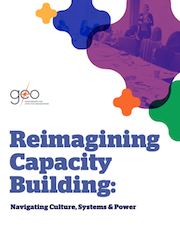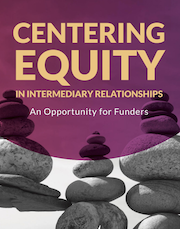Site Search
- resource provided by the Forum Network Knowledgebase.
Search Tip: Search with " " to find exact matches.
As artificial intelligence (AI) and technological advances take on an increasingly prominent role in our society, BIPOC and immigrant communities face the threat of biases and outright hostilities being encoded and automated into surveillance, enforcement, and judicial tools. At the same time, creative leaders in the nonprofit sector are leveraging and building new technologies to better deliver culturally responsive services at scale to their communities. In this two-part series on the intersection of AI, technology and immigrant justice, GCIR invites funders to deepen their knowledge in the space as well as gain insights on how philanthropy can deploy investments that build the movement’s capacity to respond to emergent threats and opportunities.
Part 2: Tech for Good: Building Innovative Tools to Serve Immigrant Communities
In the hands of creative and justice-driven leaders, computer technologies hold significant potential for advancing the public good. Across the country, nonprofits are harnessing the power of AI and building innovative tech tools to bridge gaps in culturally responsive services while expanding their organizational impact. From accessible legal tools, to on-demand translation services, to tech-based workforce development, the movement for immigrant justice is leveraging technology in creative ways to transform and scale service delivery. In this discussion, funders will learn from talented innovators about the tools they have built and how philanthropic investments can catalyze this burgeoning field.
Speakers:
Swapna Reddy, Co-Founder & Executive Director, ASAP
Daisy Magnus-Aryitey, Co-Founder & Co-Executive Director, Code the Dream
Bartlomiej Skorupa, Co-Founder & Chief Operating Officer, Mobile Pathways
Alex Mitchell, Product Manager, Tarjimly
As we navigate today's challenges and opportunities, it's important that we continue to gather, exchange ideas, and move forward the causes we value. We all know how a single conversation can spark a big idea or inspire a new partnership.  That's why you won't want to miss our much-anticipated 2024 Spring Colloquium: Empowering the Future: Harnessing AI and Data for Philanthropic Social Impact - a must-attend gathering for every funder working in New Jersey. Join us for valuable insights and opportunities to connect with colleagues and passionate thought leaders who share your commitment to driving social change.
That's why you won't want to miss our much-anticipated 2024 Spring Colloquium: Empowering the Future: Harnessing AI and Data for Philanthropic Social Impact - a must-attend gathering for every funder working in New Jersey. Join us for valuable insights and opportunities to connect with colleagues and passionate thought leaders who share your commitment to driving social change.
I look forward to seeing you there and engaging in the vibrant discussions and community building opportunities that awaits us.
Thank you to the generosity of our sponsors: Signature Sponsor - PSE&G, Collaborator Sponsor - Wells Fargo, Connector Sponsors - Campbell Soup Company, Sixers Youth Foundation, and Robert Wood Johnson Foundation, and Exhibitor Sponsor - PKF O'Connor Davies. We couldn't do this without you.
We look forward to seeing you there!
Sincerely,
Theresa Jacks, President and CEO
Council of New Jersey Grantmakers


Bank of America has announced grants totaling more than $22 million in support of advancing racial equality and economic opportunities.
A total of $18.35 million was awarded in support of higher education and workforce development, with a focus on efforts to strengthen hiring pipelines and empower students to advance their academic and career opportunities, including a previously announced $10 million grant to Spelman and Morehouse colleges to establish the Center for Black Entrepreneurship. Workforce development awards include $300,000 to GRID Alternatives in support of the SolarCorps Fellowship Program, which enables individuals from diverse backgrounds to be trained and launch careers in the renewable energy field, as well as grants to the Thurgood Marshall College Fund, Posse Foundation, Hispanic Scholarship Fund, and United National Indian Tribal Youth.
In addition, $1.3 million was awarded to assist minority and indigenous entrepreneurs and their small businesses through organizations such as the Latino Business Action Network, Echoing Green, and Our Native American Business Entrepreneurship Network (ONABEN), and $2.55 million was awarded in support of health and emergency needs, such as hunger relief and shelter focused on helping communities recover from the disproportionate impact of the coronavirus including Hispanic-Latino community-based health organizations that are part of the UnidosUS community health affiliate network and the Hispanic Federation.
"Workforce development, job creation, and access to health and housing services are some of the most pressing needs facing Black, Hispanic-Latino, and Native American individuals," said Ebony Thomas, Bank of America's racial equality and economic opportunity executive. "By providing this support alongside our national and local partners, we are further addressing many of the challenges facing under-resourced and underserved communities across the U.S."
The Princeton Area Community Foundation recently awarded $199,000 in COVID-19 Relief & Recovery Fund grants to 25 nonprofits holding summer programs.
These programs will include instructions to help students overcome learning loss caused by the pandemic.
"Through these grants, we are helping 25 nonprofits engage 2,900 children in educational and social-emotional learning programs," said Jeffrey M. Vega, President & CEO of the Community Foundation.
"We know COVID-19 caused significant disruptions to education, especially for students living in under-resourced communities, and we hope these grants will help young people rebound from some of that learning loss and re-engage children in the many community-based programs that were forced to shut down last year."
To prepare for the third phase of COVID Relief funding, the Foundation reached out to nonprofits and other stakeholders to learn about needs throughout the region.
Learning loss due to the pandemic and helping prepare students to return to classrooms were among the highest priorities cited by nonprofits.
According to a report by JerseyCAN, a nonprofit focused on education, a majority of New Jersey's third- through eighth-graders were not on grade level at the start of the 2020-21 school year because of the pandemic.
Novartis benchmarked Employee Crisis Programs, and asked fellow corporate funders via the corporate funders listserve to answer the questions below.
- If you have an Employee Crisis Program, what is the name
- Do you manage the program internally or thru a 3rd party? If you use a 3rd party, can you share their name/website and any good/bad experiences.
- Do you only support disasters or other hardships as well?
- What is the average percentage of your employees that apply for aid?
- What is your minimum and maximum funding?
- What is the average amount of aid?
- Do you provide aid directly to the employee and/or vendors?
- Do you allow employees to donate to your fund? If so, how do you promote awareness and what is the employee donation participation rate? Do you match these donations?
- Where does the program reside (CSR, Foundation, HR)?
- Please share guidelines and applications, if possible.
- Please share any other insights.
The United States Department of Labor, State of New Jersey, and City of Newark announced a $5 million grant to help provide jobs and support to hundreds of Newark residents returning home from prison over the next two years.
The grant includes $2 million in matching funds from the Bodman–Achelis Foundations, Joan Ganz Cooney, the Charles Edison Fund/Edison Innovation Foundation, the Council of New Jersey Grantmakers, the F.M. Kirby Foundation, the Manhattan Institute, the Nicholson Foundation, and the Victoria Foundation.
“The City can’t do this alone. It takes strategic alliances with federal and state officials, community and faith-based organizations, and the leveraging arm of the philanthropic institutions,” said Mayor Cory Booker. “We established the office of the philanthropic liaison, underwritten by the Council of New Jersey Grantmakers, to help create stronger connections with funders. The matching grants from the private sector show that these efforts are working.”
“The foundation community is delighted to partner with strong government leadership and the city’s philanthropic liaison in addressing the challenges faced by the growing numbers of men and women re-entering society,” said William H. Byrnes, Jr., program officer with the F.M. Kirby Foundation and trustee of the Council of New Jersey Grantmakers.
Over the past three years, the United States Department of Labor has been the lead agency for implementing the federal government’s Prisoner Reentry Initiative. “This grant will enable Newark to build on the success of the President’s Prisoner Reentry Initiative and provide over 1,200 ex-offenders with basic job skills and other assistance to help them succeed in developing new career paths,” said U.S. Secretary of Labor, Eliane L. Chao.
The combined $5 million award will enable the City to strengthen and expand services via a network of partners working through a one-stop center, Opportunity Reconnect, at Essex County College.
The goal of the grant is keep people working, help employers find workers, and keep families safe by successfully integrating ex-prisoners back into their communities through a comprehensive system of services including case management, mentoring, skills assessment, and referrals to health care providers.
State and local agencies will be coordinated to strengthen the city’s network and avoid duplication of efforts.
“We’ve managed to make funders more aware of the barriers that prevent ex-prisoners from being successful," said Jeremy Johnson, Newark’s philanthropic liaison. "Grantmakers have become increasingly involved as a result.”
Nonprofit Finance Fund's Annual Survey chronicles the challenges facing the nonprofit sector and calls out some of the targeted investments we can start to agree on as a society to salvage the investment we have collectively made in our social infrastructure. We believe that a coordinated intervention now will not only better prepare us for inevitable future economic crises; it can lead to a happier, healthier community for us all.
The New Jersey State Council on the Arts awarded more than $35.6 million in grants to support more than 700 arts organizations, projects, and artists throughout the state. The grants were approved at the Arts Council's 55th Annual Meeting, held virtually. The awards announced today were part of the largest state appropriation the Council has ever received in its 55-year history – $31.9 million as part of the state budget approved by Governor Murphy last month. Today’s grant awards also included $7.5 million in Coronavirus Relief Funds, which were signed into law by Governor Murphy earlier this year as part of a multi-bill package aimed at economic recovery.
Secretary of State Tahesha Way addressed attendees at the meeting, commending their creativity and resiliency during the pandemic. "The innovation New Jersey’s arts community has shown over these last 16 months is absolutely awe-inspiring,” said Secretary Way. “The arts have been a crucial source of healing and connection throughout the pandemic, and I am proud to work closely with the State Arts Council as they lead the field with responsive grants and services so people can continue to enjoy and engage with New Jersey arts.”
According to a collaborative study of the arts sector, led by ArtPride NJ, New Jersey nonprofit arts organizations have lost more than $100 million and counting due to pandemic-related closures, cancellations, and lost contributed and earned revenue. When the arts sector is open and thriving, it generates more than $660 million in economic activity statewide, employs nearly 22,000 workers, and engages more than 8.3 million people who stay in hotels, and eat and shop locally. For more on the important role the arts play in recovery, visit KeepJerseyArtsAlive.org.
“We are grateful to Governor Murphy and the legislature for this monumental increase in funding and for recognizing the need for robust public support of the arts right now,” said Council Chair Elizabeth Mattson. “This funding is not only vital to ensuring the arts can continue to move forward and innovate, but will support important work to foster a more equitable and inclusive arts community. We know there is still much work to be done, and we look forward to working alongside our partners and colleagues in the field as we embark on a new chapter together.”
